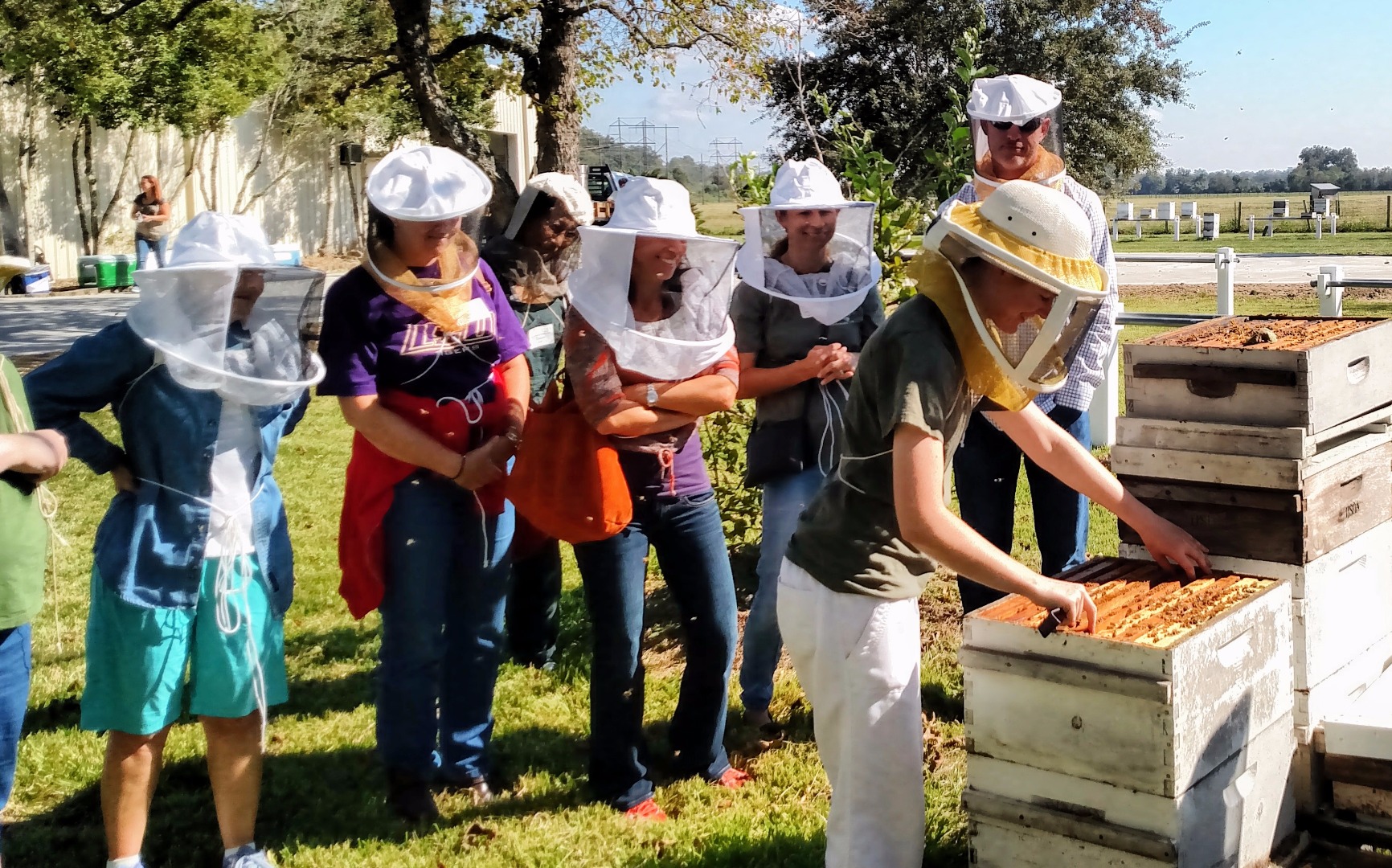 LBA and USDA-ARS
LBA and USDA-ARS 
FALL FIELD DAY
Help your bees by learning the latest research and practices!
Register now to hear presentations from experts right here in our state at our world-class bee lab in Baton Rouge. For close to 100 years, the bee lab has been providing helpful and practical information for beekeepers. Don't miss this opportunity to gather information first-hand from these researchers during this year's Fall Field Day.
Saturday, October 15, 2022
LSU RURAL LIFE MUSEUM
4560 Essen Lane Baton Rouge, LA 70809
Varroa mites can cause massive colony losses; they are the single largest problem facing beekeepers since they spread to the United States from Southeast Asia in 1987. While miticides used to control Varroa exist, resistance is developing to some of them.
“We would like to replace reliance on chemical controls with honey bees...that have high mite resistance of their own and perform well, including high honey production...” said Frank Rinkevich, Research Entomologist.
Learn the latest from the best experts in the world, the USDA ARS researchers and LBA beekeepers in the morning, lunch included in the ticket price, and hands-on demonstrations in the hives for the afternoon with the researchers and our LBA commercial beekeepers.
Ticket price also will includes access to The Rural Life Museum! (view the largest collection of Louisiana vernacular architecture and the most extensive collection of material culture items from the 18th and 19th centuries).
2022 Field Day information: (Bring your beekeeping gear!)
The Field Day will include a series of talks in the morning from members of the Louisiana Beekeepers Association and the USDA-ARS staff about Louisiana beekeeping and research being conducted at the USDA-ARS lab. The afternoon features break-out sessions for beekeepers of all ranges of experience and plenty of opportunity for hands-on hive demonstrations.
Bring your bee suit for one of the following:
The beginning beekeeper course is directed to those who have little to no beekeeping experience. Topics will include basic bee biology as well as necessary beekeeping equipment and management techniques. A question and answer session precede a practical demonstration in honey bee colonies.

The intermediate beekeeping course is focused on the beekeeper with a moderate amount of experience that is now ready to take it to the next level. Topics will include spring colony management, nutrition, and examining open colonies, followed by a final talk on treatment options for Varroa mites.
There will be a workshop for advanced beekeepers that focuses on selecting and rearing queens.



About the USDA ARS Honey Bee Lab in Baton Rouge
The mission of the Honey Bee Breeding, Genetics and Physiology Research Unit is directly related to improving honey bee stock and honey bee management. This broad mission includes components related to problems caused by varroa mites, tracheal mites and microsporidians in the genus Nosema. The devastating problems caused by varroa mites and the serious problems caused by tracheal mites and Nosema are targeted as the most critical. Scientists are engaged in breeding and testing honey bees for resistance to mites and Nosema, evaluating mite-bee interactions to better describe breeding criteria, and evaluate stock production processes to explore and solve stock problems caused by mites and Nosema.
==========================================================
Discover Louisiana's Rural Past
The LSU Rural Life Museum holds the largest collection of Louisiana vernacular architecture and the most extensive collection of material culture items from the 18th and 19th centuries. The museum includes 32 historic outbuildings that spread over 25 acres and are divided into four sections: the Working Plantation, the Upland South Region, the Gulf Coast Region, and an Exhibit Barn.
Directions https://www.lsu.edu/rurallife/visit/directions.php
LSU Rural Life Museum 4560 Essen Lane Baton Rouge, LA 70809
After driving through the front gate at Essen Lane, continue driving 1.5 miles to the back of the property to get to the museum. Parking is free and available in front of the museum.
Driving East on I-10 towards New Orleans
Exit 160/Essen Lane. Turn right onto Essen Lane, then at the first traffic signal turn right to enter the property of the LSU Burden Museum and Gardens. The LSU Rural Life Museum and Windrush Gardens is located at the back of the property. Follow the road 1.5 miles to the museum.
Driving West on I-10 towards Baton Rouge
Exit 160/Essen Lane. Turn left onto Essen Lane at the traffic signal. Then go under the interstate overpass, at the second traffic signal turn right to enter the property at LSU Burden Museum and Gardens. The LSU Rural Life Museum and Windrush Gardens is located at the back of the property. Follow the road 1.5 miles to the museum.